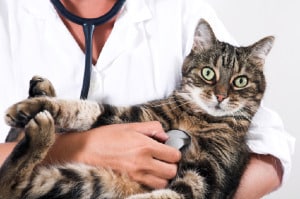
Welcome to the first Pet Care Column! As one of only 178 board certified veterinary oncologists in the country and Chief of Staff at Veterinary Cancer Group, the largest private comprehensive cancer center in the world, I look forward to bringing you educational information about cancer in animals, as well as, other important tips to help you keep your four legged family members healthy and happy for years to come.
I am always intrigued by the reaction I receive when asked what I do for a living. The most common response is “Wow!,” “I didn’t know animals got cancer!,” or “I never realized veterinarians specialized the way MDs do.” The veterinary profession has changed considerably over the last 20 years. We now have essentially the same areas of expertise as seen in human medicine: oncology, surgery, radiology, internal medicine, dermatology, neurology, cardiology, etc.
As specialists, we are an extension of your primary care veterinarian. Your family practitioner is experienced at understanding all aspects of pet care, however rapid advances in the medical profession make it difficult for practitioners to remain current with advances in technology and techniques. Today, specialists are able to team with veterinarians to provide the most optimum care for your pet. Veterinarians, when faced with a medical or surgical situation outside their comfort zone, will likely refer you to a specialist. As part of the health care team, the specialist is responsible for regular, timely communication with your primary care doctor, informing of all treatments and the progress your pet is making in response to therapy.
While I hope you are able to dodge the cancer bullet in all of your loved ones, the most common cause of death of a dog or cat over 10 years of age is cancer. I have personally lost four of my own pets to cancer. The aging process is one of the major factors contributing to the cause of cancer. Genetics, environment, deterioration of the immune system, and bad luck are other factors.
By definition, cancer is a disease of abnormal cells which have the ability to divide uncontrollably. Benign cancers do not spread to other parts of the body, and, if removed completely, will not come back. Malignant tumors, however, have the ability to both recur and spread (metastasize), even if completely removed surgically. In animals, most malignancies cannot be cured. They can often be controlled for extended periods of time, with an outstanding quality of life.
My goal as an oncologist, is to ensure that the treatment not be worse than the disease. Our feeling is if we can extend quality time for our pets, we have achieved our mission. The good news in treating pets vs. people, is that my patients rarely suffer side effects from chemotherapy and radiation.
One of the main reasons for this is that our pets are not psychologically impacted the way we are: animals don’t know they have been diagnosed with a terminal illness and no one is telling them they will get sick from chemotherapy! We also use lower dosages in dogs and cats than are used in people and this contributes to the treatments being better tolerated. We want our pets to live longer, but not at the expense of quality time.
One of the most exciting new advances in cancer therapy is the availability of a vaccine to treat dogs with malignant melanoma. Veterinary and human oncologists teamed up to develop this vaccine; results in dogs have been so encouraging that this technology has entered the clinical trial stage in people!
In articles to come, I look forward to sharing my experiences and expertise with you. While most of the articles will relate to issues at the forefront of caring for your animals, I will also discuss other issues relating to cancer. My objective: better quality of life for your pet and you!




